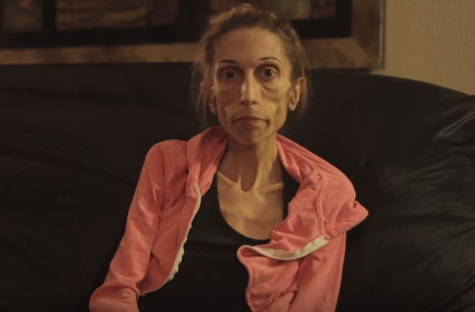Rachael Farrokh, Formerly 40-Pound Anorexic Woman, Makes Incredible Recovery Following Treatment

Four months ago, 37-year-old Rachael Farrokh weighed only 40 pounds. The 5-foot-7 California actress, suffering from anorexia nervosa, recorded a video as a plea for help — hoping people would donate to fund her treatment, her only hope for recovery. In the original video, released in May of this year, Farrokh was little more than bones and sagging skin; weak and exhausted, she could hardly speak.
But today, Farrokh has made a transformative recovery. In four months, she put on enough pounds to get her to a relatively normal body weight — and she is now an eating disorder activist, hoping to broaden awareness about eating disorders and mental illnesses that are often dismissed and stigmatized.
And now that she has survived the worst of her disease, Farrokh is expressing her gratitude to everyone who supported her during the darkest hours. “I have a huge family — it’s called the world,” Farrokh told NBC News Los Angeles. “They embraced me with one big hug!”
Before raising nearly $200,000 to help her get treated at a clinic in Portugal, Farrokh went through dozens of anorexia treatments that persistently failed. She was often rejected from anorexia treatment facilities because she weighed too little, and was losing hope for recovery when she reached out for the world’s support.
“They were so worried about my body, and my body wasn’t responding because they didn’t understand the brain had to come along with the body,” Farrokh told NBC News. “My mind is so much more clear and my thinking has developed.” The Portugal clinic was the first place that actually worked, and she finally felt like she was “treated with respect,” she explained. “I didn’t know that I deserved it.”
Anorexia nervosa falls under mental illnesses, and while public perception of the disease is inaccurate (many people believe that anorexic patients choose to harm themselves), it’s a disorder that can’t be controlled. People who suffer from anorexia obsess over their weight and see themselves as being physically bigger than they really are. They often constrict meals and exercise compulsively, ultimately getting to such a low weight that it can put a strain on their cardiovascular system and cognitive function, and ultimately lead to death. For Farrokh, anorexia was also a lot about lack of self-worth; she later explained that she never felt “good enough” or “worthy.”
Today, Farrokh is doing well — though she still has a long way to go to fully recover. Posting on her Facebook page, Farrokh published an update from her doctor:
Her tests are generally positive, though it will take time for her body to heal from the trauma it has sustained. Every day she gets stronger in her mind. … Every day she imagines a future, possible now, instead of the death that was potentially imminent. Rachael dreams of being well, of being strong enough to turn back to you the support she has received, of teaching the world what she has learned.
Published by Medicaldaily.com



























